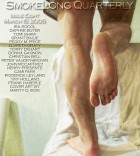I.
An 8-year old girl wearing a red felt coat and shining white skates stands at the edge of a frozen pond and tests the ice. She pushes out, tentatively at first, then stronger and harder, swooping to the left and to the right, each stroke striking out in opposite directions and correcting the other so that the girl’s path is perfect and pristine, each set of flashing blades counteracting the will of the other. After a few minutes, the girl, giddy and flushed, drags one skate behind her and curves slowly to a stop. She stares into the water’s hard, opaque surface and jumps once, then twice, hard, on the stubborn mirror, satisfying herself with the deep grooves scarring the pond’s frosted surface.
Something might happen next—she might transport herself in widening arcs, faster and faster, farther and farther, in an ecstasy of self-confidence, until a set of blades, determined to lead her astray but so far frustrated, strikes an imperfection in the ice, a buried root or a congealed stone, and sends her spinning, a red pinwheel, a sprawled crimson angel out of control then sliding gently to a stop just so, beautiful, and alone. That might happen.
But I’d rather leave her here, where she is now, red-cheeked, strong, and satisfied.
II.
It’s Saturday morning, and a little boy of seven is hungry. His mother is in bed, with a headache, and his eleven-year-old brother is watching cartoons and eating the last bowl of cold cereal. The boy asks his brother what there is to eat. “Why don’t you make some spaghetti?” the brother giggles through a mouthful of milk and sugar. The little boy goes to the kitchen and drags a chair from the table to the stove, where a large pot sits on a back burner. He dumps dry spaghetti from a nearby jar into the pot, carries it to the sink, turns on the faucet and fills the pot. The water sounds like it’s laughing as it spills through the yellow stalks onto metal, and the boy laughs, too. When the pot is full, it is heavy, but the boy manages to drag it across the counter and bump it onto the front burner, spilling just a little along the way. He turns the burner all the way and sits quietly in the chair, watching the pot. The boy grins as the pot begins to jiggle and spit. He climbs down from the chair, goes into the other room and asks his brother if he wants some spaghetti. His brother laughs and says “Sure, bring me a great big bowl of spaghetti!” The little boy goes back into the kitchen, climbs on the chair and grasps the hot handles of the boiling pot. They sear his hands and the boy is not strong and the pot spills and the hot water scalds his skin through his thin little boy pajamas and he falls screaming from the chair to the floor. He lies there on his back, a splayed starfish, red and writhing in a hot net of stringy, undercooked pasta.
What happens next? Maybe the mother, awakened by screaming, frantically calls for an ambulance while the brother comforts the little boy. Or maybe the brother, distracted from his cartoons by the noise, finds the little boy on the floor and runs to get the mother, telling her his little brother needs to go to the doctor. Maybe the mother, headachy and irritated, tells the brother to take care of the little boy himself, and goes back to sleep. Maybe the brother does his best to clean up the mess and tend to the little boy with ice and aspirin and clumsy words.
Maybe. Either way, the boy is scarred. And hungry.
III.
The old man is drawn grumbling out of his bedroom by the high, sharp, continuous whistling of the teakettle. His gnarled hands struggle with his suspenders as he makes his way to the kitchen. He stops when he notices his wife lying face down on the floor in front of the couch, twisted up in the red and white afghan crocheted by their youngest. He calls her name, goes to her, touches her carefully, then rolls her onto her back and gives her a little shake. She doesn’t respond. Her eyes are closed. He reaches for her purse on the tiny table behind him, and retrieves the compact silver mirror she used to use for “touchups” on their dates so long ago. She didn’t need it, he would joke, and she would blush and look down and that was all so long ago.
The old man’s hand trembles as he brings the tiny mirror to his wife’s mouth. The teakettle shrieks.


 The core workshop of SmokeLong Fitness is all in writing, so you can take part from anywhere at anytime. We are excited about creating a supportive, consistent and structured environment for flash writers to work on their craft in a community. We are thrilled and proud to say that our workshop participants have won, placed, or been listed in every major flash competition. Community works.
The core workshop of SmokeLong Fitness is all in writing, so you can take part from anywhere at anytime. We are excited about creating a supportive, consistent and structured environment for flash writers to work on their craft in a community. We are thrilled and proud to say that our workshop participants have won, placed, or been listed in every major flash competition. Community works.